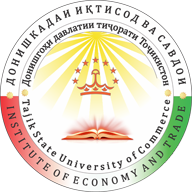Department of Economics Theory
The department of Economic Theory functions from the day of establishing SEC TSUC under the name “Economics theory and world economy.” Until 2010 it was the issuing department, which trained specialists in a wide range of specialties 0606 “World Economy”.
Then, as a result of the merger of the two universities of the SEC and the Tax and Legal Institute, it continued its activities as independent department named “Economics Theory”. It is one of the successful and promising departments of the IET TSUC. The academic staff consists of 14 highly qualified professors.
Lecturers of the department conduct their activities in accordance with the curriculum, compiled for both full-time and part-time students. There is a whole set of educational and scientific literature for lectures, seminars and independent work.
For the successful organization of the entire educational process, the department has all the material and technical conditions. It is equipped with two modern computers, two graph projectors, two printers and a laptop.
Each lecturer of the department uses technical equipment of the department and makes appropriate entries in special journals.
In all the disciplines of the department, such as: economic theory, microeconomics, macroeconomics, the history of economic doctrines, economic security of the state, educational visual aids, over 30 different tables, diagrams and other visibility, banners are prepared by lecturers, that are widely used in the educational process.
Teaching aids of the department.
Lecturers of the department conduct classes in the following disciplines: economic theory, microeconomics, macroeconomics, the history of economic doctrines, economic security of state, economics and sociology of labor, social policy, etc. Training programs for all disciplines are compiled in accordance with state standards of the Ministry of Education of the Republic of Tajikistan.
The curriculum of the department has specific goals and is aimed at developing a modern economic worldview, meeting the needs of society, training highly qualified specialists, and improving the quality of education.
The main goal of the department is training of highly qualified specialists, bachelors, masters, scientific and pedagogical personnel of the highest qualification of the new generation in accordance with state educational standards.
Educational and methodical materials, manuals, books.
The list of books, manuals, educational and methodical materials, handouts prepared by experienced lecturers in conjunction with young specialists of the department are given below.
- Azimov A.J., Boboev G.G., Pulotova M.H. Macroeconomics. Training and methodology material. Tajikmatlubot. Institute of Economics and Trade of the Tajik State University of Commerce. Khujand, publishing house Nargis. 2012, 20 printed materials, 320 pages.
- Azizov F.H., Abdugafforov A.A., Rizokulov T.R. Course in economic theory, educational material. Khujand. 2011.
- Azizov F.H., Bobokalonova D.K., Mukhadberdiev H., Ergashev A.E. Course in economic theory for non-economic faculties. Khujand. 2009
- Ashraf Ergashev, Fattah Azizov, Dilbar Bobokalonova. Course on economic theory for non-economic faculties, part 1. Khujand. 2009
- Hakberdi Muhammadberdiev, Fattah Azizov, Dilbar Bobokalonova. Course on economic theory for non-economic faculties, part 2. Khujand. 2009
- Alijonov J.A., Alijonova S.A., Rakhmonov Sh.A. Macroeconomics: Basic concepts. Tests and tasks. Tutorial. Tojikmatlubot. TSUC.
- J.A. Alijonov Macroeconomics. Educational-methodical materials. Tajikmatlubot. TSUC.
- Azizov F.H., Azimov A.J., Mukhadberdiev H., Fayziboev M.M. Educational and methodical material on microeconomics.
- Azizov F.H., Azimov A.J., Nurboev N.M. Educational and methodical material on macroeconomics.
- Yusufov A.K., Azizov F.H., Fundamentals of Economics. Tajikmatlubot IET TSUC. publishing house IET TSUC, Khujand, 2010, 98 p.
- Yusufov A.K., Azizov F.H., Karimov H. Dictionary of Tajik-English economic terms. Khujand 2011, 104p.
- Azimov A .J., Boboev G. G., Pulotova M. Macroeconomics Tajikmatlubot institute of economics and trade of the Tajik state university of commerce. H.2012, p320
- Azizov F.H., Azizov J.F., Mahmudov A.A., Makhmudova N.F. Dictionary of words and phrases of market economy. Khujand.2012, 188p.
- Abdurakhmon Khakimov. National Economy: Fundamentals of Security and Competitiveness. Educational tools for students of higher educational institutions Dushanbe, publishing house “Irfon”, 2010
- Alijonov J.A., Features of import-substituting growth and prerequisites for its implementation in the transition economy of the Republic of Tajikistan. Institute of Economy and Trade of Tajik State University of Commerce. Khujand-2012.
- Alijonov J.A., Halimov I.M. Basic concepts of economic theory (microeconomics and macroeconomics), Khujand. 2014.
- Alijonov J.A., Halimov I.M., Complex of problems on macroeconomics, Khujand. 2014.
- Azimov A.J., Azizov F.H., The economic theory. Irfon 2014.
Tasks of the department are: to ensure the quality of education and meet the needs of the country in qualified specialists with modern knowledge in the field of market economy, management, marketing, personnel management, in innovative fields of activity and financial and credit sphere, with research skills in forming a layer of civilized entrepreneurs for development of small and medium business.
The introduction of new forms and methods of teaching is realized through the development, testing and implementation in practice of various forms of conducting the educational process with the aim of increasing its effectiveness (business games, situational analysis, testing, game exercises, use of information resources, electronic textboo ks and teaching aids, application of entrepreneurial ideas in the content of courses, as well as development and consolidation of skills based on context training, learning from experience, studying practices, etc., the use of a problem-oriented interdisciplinary approach, which is reflected in the creation of educational and methodological complexes.
In order to improve the quality of education, the system of education is constantly being improved due to the orientation of the educational and scientific process to practical activities, the solution of various tasks. This is due to the constant monitoring of the level of student preparation, the strengthening of the role of disciplines that ensure the socialization of students, the creation of an effective state-public system of examination and quality control of educational literature, the creation of a system for assessing the quality of education, etc., and optimizing the educational, psychological and physical load of students.
